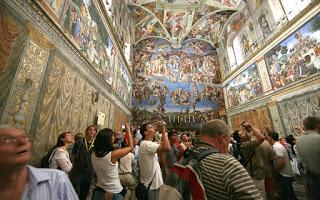
If you plan to visit the Vatican, the chances are you’re going to see the Sistine Chapel in all its glory. This impressive religious building is one of the most famous of its kind in the world, boasting world-famous frescoes and fascinating history.
Set inside the Apostolic Palace, the Sistine Chapel acts as the official residence of the Pope. It sits on the former site of the Capella Magna but takes its name from Pope Sixtus IV who dedicated his time to restoring the building in the late 1400s. Ever since then, the Sistine Chapel has functioned as a place for leaders of the Catholic church to gather and for functionary papal activity. Even today, it remains an important religious place and is the site of the Papal conclave, which is the process that takes place when a new Pope is chosen.
Perhaps the most famous thing about the Chapel, though, is its eye-catching frescoes that adorn its inside walls and ceilings. Most notable of these is the incredible ceiling fresco, The Last Judgement, painted by Michelangelo.
The chapel itself was created by altering the structure of the building that sat in that exact spot before it was turned into the Chapel. Pope Sixtus IV wanted to recreate the Temple of Jerusalem and was determined to have the chapel feature the exact same dimensions as in the Bible.
During his reign, he gathered together a collection of world-famous Renaissance painters, including Pietro Perugino, Domenico Ghirlandaio, Sandro Botticelli, and Cosimo Rosselli, who he commissioned to create sprawling frescoes across the inside walls of the chapel. They created paintings that showcased the Life of Moses and the Life of Christ, intertwined with portraits of popes past and present. The frescoes were finished up in 1482 and, in the following year, the first mass was celebrated in the Sistine Chapel, where it was consecrated and dedicated to the Virgin Mary.
It wasn’t until later, at the start of the 1500s, that Pope Julius II commissioned the one and only Michelangelo to paint the ceiling of the chapel. Today, the masterpiece is one of the most famous works of art in the world and draws in millions of visitors every year – but, initially, Michelangelo was hesitant to do it, claiming that he was a sculptor not a painter. Pope Julius II persisted, though, and Michelangelo finally started work on painting The Last Judgement.

